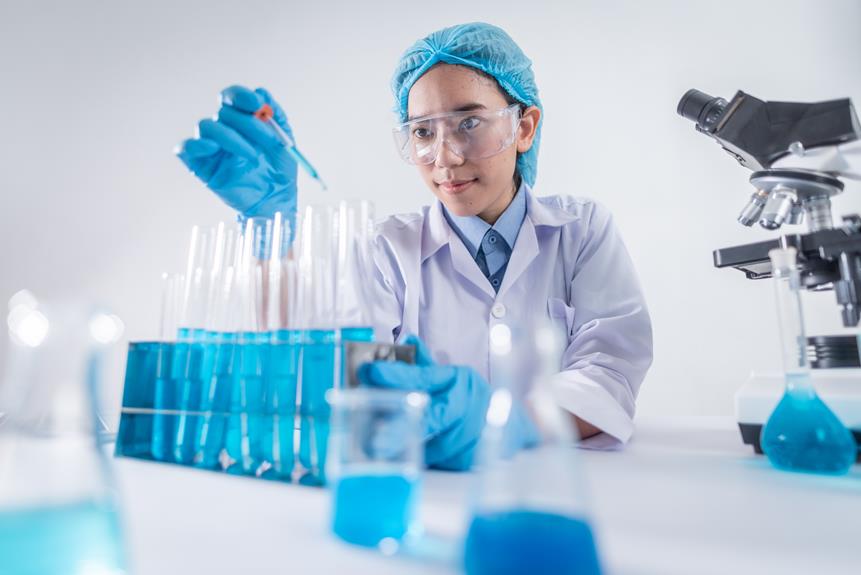Can combat sports truly be fair and free from performance-enhancing drugs? This is the burning question that has been debated for years, especially in the context of organizations like ONE Championship.
As one of the leading mixed martial arts promotions, ONE Championship has taken a proactive approach to combatting doping by implementing a rigorous drug testing program. In this article, we will delve into the effectiveness, motivations, policies, and consequences of ONE Championship's drug testing, shedding light on their commitment to upholding the integrity of the sport.
Key Takeaways
- ONE Championship has been conducting drug testing for steroids and performance-enhancing drugs since August 2022.
- The testing process is carried out by International Doping Tests & Management (IDTM) in accordance with the World Anti-Doping Agency (WADA) Code.
- Fighters are tested both in and out of competition, using urine and blood samples.
- The consequences for failing a drug test include suspensions, fines, and loss of prize money, with repeat offenders potentially facing longer suspensions or lifetime bans.
History of ONE Championship Drug Testing
Since August 2022, ONE Championship has implemented a rigorous drug testing program to ensure the integrity of its competitions and maintain a clean environment for its athletes. This drug testing program has had a significant impact on fighter performance and has set ONE Championship apart from other combat sports organizations.
In comparison to drug testing in other combat sports, ONE Championship's program is comprehensive and stringent. They employ the services of International Doping Tests & Management (IDTM) and adhere to the World Anti-Doping Agency (WADA) Code. Fighters are tested both in and out of competition, using urine and blood samples. This level of testing helps to detect a wide range of banned substances, including steroids and performance-enhancing drugs (PEDs).
The implementation of this drug testing program is a proactive step by ONE Championship to combat doping in combat sports. By ensuring that athletes compete on a level playing field, the organization upholds the values of fairness and integrity. The program also serves as a deterrent, sending a clear message that doping will not be tolerated.
Process and Procedures of Drug Testing
Continuing the discussion from the previous subtopic, ONE Championship implements a thorough and systematic process for drug testing its fighters. Here are three key aspects of ONE Championship's drug testing process:
- Stringent Testing Procedures:
ONE Championship conducts both in-competition and out-of-competition drug tests on its athletes. The exact testing process, including the use of blood or urine samples, is not publicly disclosed. However, it is carried out by International Doping Tests & Management (IDTM) in accordance with the World Anti-Doping Agency (WADA) Code.
- Wide Range of Banned Substances:
ONE Championship tests for a comprehensive list of banned substances, including steroids and performance-enhancing drugs (PEDs). This ensures that fighters are held accountable for any prohibited substances they may be using.
- Comparison with Other MMA Promotions:
ONE Championship's drug testing process is comparable to other major MMA promotions, such as Bellator and the UFC. These promotions also implement anti-doping testing to maintain a professional and respectable image. However, the efficacy of ONE Championship's drug testing measures and their success in reducing doping among fighters may vary from promotion to promotion.
Results of Anti-Doping Tests in ONE Championship
The results of anti-doping tests in ONE Championship have revealed instances of fighters using banned substances, which has had a significant impact on the reputation of the organization. While ONE Championship has taken a proactive approach to implement drug testing and suspend fighters who fail the tests, the fact that some fighters have been found to be using prohibited substances raises questions about the effectiveness of the testing process.
When comparing ONE Championship's drug testing results with other MMA promotions, it is important to note that the prevalence of failed drug tests is not unique to ONE Championship. Many other promotions, including Bellator and the UFC, have also experienced fighters testing positive for banned substances. However, the way in which organizations handle these situations and the severity of the punishments can greatly differ.
Limitations and Challenges of Drug Testing
ONE Championship's drug testing efforts encounter various limitations and challenges in ensuring a clean and fair competition environment. These limitations include:
- Efficacy of drug testing in combat sports: Drug testing in combat sports, including mixed martial arts (MMA), faces challenges in effectively detecting all types of performance-enhancing drugs (PEDs). Some PEDs may be undetectable or require specialized testing methods, making it difficult to catch all athletes who are using these substances.
- Strategies to improve the effectiveness of drug testing: To enhance the effectiveness of drug testing, organizations like ONE Championship can implement several strategies. These include increasing the frequency of testing, utilizing more advanced testing methods, collaborating with anti-doping agencies, and implementing a comprehensive education program to deter athletes from using PEDs.
- Balancing fairness and privacy concerns: Drug testing can be intrusive and may raise concerns about athlete privacy. Organizations must strike a balance between ensuring a fair competition environment and respecting the rights and privacy of the athletes being tested.
Addressing these limitations and challenges is crucial to maintaining the integrity of combat sports and promoting a level playing field for all athletes.
Motivations Behind Anti-Doping Testing
Promotions like ONE Championship implement anti-doping testing to ensure the integrity of their competitions and promote a fair playing field for all athletes. However, there are other motivations behind their anti-doping efforts.
One such motivation is to attract more viewership. Anabolic steroids and performance-enhancing drugs (PEDs) have been known to enhance the quality of fights, making them more exciting and enticing for viewers. By implementing anti-doping testing, promotions like ONE Championship aim to create a cleaner and more respectable image, reducing the stigma associated with PED use.
This, in turn, can attract a wider audience who may be more inclined to support and engage with the promotion. By promoting fair and clean competition, ONE Championship aims to captivate viewers and maintain their reputation as a premier martial arts organization.
Overview of ONE Championship's Drug Testing Policy
One Championship's drug testing policy includes random testing of athletes, both in and out of competition, using both urine and blood samples. This comprehensive approach ensures that athletes are held accountable for their actions and helps maintain the integrity of the sport.
Here is an overview of ONE Championship's drug testing policy:
- Implications for fighter safety: By implementing a strict drug testing policy, ONE Championship is committed to ensuring the safety of its fighters. The use of banned substances, such as steroids and performance-enhancing drugs (PEDs), can lead to serious health risks and unfair advantages in competition. Drug testing helps create a level playing field and promotes fair competition.
- Comparison with other MMA promotions: ONE Championship's drug testing policy sets it apart from other MMA promotions. While some organizations have faced criticism for inadequate drug testing protocols, ONE Championship's commitment to random testing and the use of both urine and blood samples demonstrates a proactive approach to maintaining a clean sport.
Consequences for Failing a Drug Test
Athletes who test positive for banned substances face significant consequences, including suspensions, financial penalties, and forfeiture of prize money. These consequences are in place to deter athletes from using performance-enhancing drugs (PEDs) and to maintain the integrity of competition. In addition to these immediate consequences, there are also long-term effects and an impact on reputation that athletes must consider.
Failing a drug test can have serious long-term effects on an athlete's career. It can lead to a tarnished reputation, loss of sponsorships, and damage to future opportunities. Athletes who are known for using PEDs may struggle to regain the trust of fans, promoters, and fellow athletes. The negative publicity and stigma associated with doping can be difficult to overcome.
Furthermore, the impact on reputation extends beyond the individual athlete. It can also reflect poorly on the organization they represent, such as ONE Championship. Promotions strive to maintain a clean and fair image, and any association with doping can undermine that reputation.
Here is a table summarizing the consequences for failing a drug test in ONE Championship:
| Consequences | Examples |
|---|---|
| Suspensions | 6 to 18 months |
| Financial penalties | Fines |
| Forfeiture of prize money | Loss of earnings |
| Tarnished reputation | Damage to athlete's image |
| Loss of sponsorships | Reduction in financial support |
| Damaged future opportunities | Difficulty in securing fights and contracts |
It is clear that failing a drug test in ONE Championship can have severe repercussions for athletes. The combination of suspensions, financial penalties, and the long-term effects on reputation serve as a strong deterrent against the use of banned substances. This ensures a fair and clean competition environment while maintaining the integrity of the sport.
Importance of Drug Testing for Fairness and Integrity
Drug testing plays a crucial role in ensuring fairness and maintaining the integrity of combat sports competitions. Here are three reasons why drug testing is important in combat sports:
- Upholding Fairness: Drug testing helps create a level playing field by deterring athletes from using performance-enhancing substances that provide an unfair advantage. It ensures that every competitor has an equal opportunity to succeed based on their natural abilities and skills.
- Protecting Athlete Safety: Performance-enhancing drugs can have serious health consequences for athletes. Drug testing helps to safeguard the well-being of competitors by discouraging the use of substances that may harm their physical and mental health. It also promotes a culture of clean and safe competition.
- Preserving the Integrity of the Sport: Drug testing sends a strong message that cheating will not be tolerated in combat sports. It maintains the integrity of the sport and upholds the values of honesty, sportsmanship, and respect. By detecting and penalizing those who violate anti-doping regulations, drug testing helps to preserve the credibility and reputation of combat sports.
Frequently Asked Questions
How Often Are Fighters Randomly Drug Tested by ONE Championship?
Fighters in ONE Championship are randomly drug tested as part of their strict drug testing policy. The exact frequency of testing is not publicly disclosed, but it is carried out both in and out of competition, ensuring the integrity of the sport.
Are There Any Specific Penalties for Fighters Who Refuse to Take a Drug Test?
Fighters who refuse to take a drug test in ONE Championship face severe penalties, including suspension, fines, and loss of prize money. Repeat offenders may receive longer suspensions or lifetime bans, ensuring the integrity of the sport.
Does ONE Championship Publicly Disclose the Names of Fighters Who Fail Drug Tests?
ONE Championship does not publicly disclose the names of fighters who fail drug tests. While they have a strict drug testing policy, their disclosure policy may be aimed at protecting the privacy and reputation of the fighters involved. Transparency in drug testing is essential for maintaining integrity in sports.
How Does ONE Championship Handle Cases of Fighters Testing Positive for Banned Substances Due to Contaminated Supplements?
ONE Championship maintains fairness in drug testing by handling cases of fighters testing positive for banned substances due to contaminated supplements. They educate athletes about the dangers and consequences of doping, encourage the use of approved supplements, and work closely with anti-doping agencies to ensure integrity in competitions.
Does ONE Championship Conduct Testing for Recreational Drugs, Such as Marijuana?
ONE Championship conducts drug testing to ensure fairness and integrity in competitions. While their policy focuses on steroids and PEDs, it's unclear if they test for recreational drugs like marijuana. Testing can impact fighter performance by deterring drug use.
Conclusion
In conclusion, ONE Championship's drug testing program has been implemented to ensure a level playing field in combat sports and maintain the integrity of the sport.
The organization's commitment to anti-doping testing demonstrates their dedication to fair competition and the protection of their athletes.
While there may be limitations and challenges in conducting drug tests, the motivation behind these measures is clear – to create a clean and respected martial arts environment.
ONE Championship's drug testing policy is crucial in upholding the fairness and integrity of the sport, much like a vigilant referee ensuring a fair match.
- 15 Best Martial Arts Weapons (Fighting & Training) - October 14, 2024
- Is Fencing a Martial Art? (Yes, 4 Reasons Why) - October 14, 2024
- 7 Best Martial Arts for Self-defense Ranked (Highly Effective) - October 14, 2024










